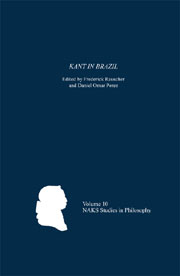Book contents
- Frontmatter
- Contents
- Acknowledgments
- Note on Sources and Abbreviations
- Introduction
- 1 Two Centuries of Kantian Studies in Brazil
- 2 Self-Consciousness and Objective Knowledge in the Transcendental Deduction of the Critique of Pure Reason
- 3 Intuitive Knowledge and De Re Thought
- 4 Predicative Judgments and Existential Judgments: Apropos Kant's Critique of the Cartesian Ontological Argument
- 5 An Experiment with Practical Reason
- 6 On the Faktum of Reason
- 7 Critique, Deduction, and the Fact of Reason
- 8 The Noncircular Deduction of the Categorical Imperative in Groundwork III
- 9 The Distinction between Right and Ethics in Kant's Philosophy
- 10 Right and the Duty to Resist, or Progress toward the Better
- 11 The Fundamental Problem of Kant's Juridical Semantics
- 12 Right, History, and Practical Schematism
- 13 Cosmopolitanism: Kant and Kantian Themes in International Relations
- 14 A Typology of Love in Kant's Philosophy
- 15 The Meaning of the Term Gemüt in Kant
- 16 Between Prescriptive Poetics and Philosophical Aesthetics
- 17 The Purposiveness of Taste: An Essay on the Role of Zweckmässigkeit in Kant's Critique of Aesthetic Judgment
- 18 Freedom in Appearance: Notes on Schiller and His Development of Kant's Aesthetics
- 19 Reading the Appendix to Kant's Critique of the Teleological Power of Judgment
- 20 Symbolization in Kant's Critical Philosophy
- Bibliography of Works in German and English
- List of Contributors
- Index
7 - Critique, Deduction, and the Fact of Reason
Published online by Cambridge University Press: 05 February 2013
- Frontmatter
- Contents
- Acknowledgments
- Note on Sources and Abbreviations
- Introduction
- 1 Two Centuries of Kantian Studies in Brazil
- 2 Self-Consciousness and Objective Knowledge in the Transcendental Deduction of the Critique of Pure Reason
- 3 Intuitive Knowledge and De Re Thought
- 4 Predicative Judgments and Existential Judgments: Apropos Kant's Critique of the Cartesian Ontological Argument
- 5 An Experiment with Practical Reason
- 6 On the Faktum of Reason
- 7 Critique, Deduction, and the Fact of Reason
- 8 The Noncircular Deduction of the Categorical Imperative in Groundwork III
- 9 The Distinction between Right and Ethics in Kant's Philosophy
- 10 Right and the Duty to Resist, or Progress toward the Better
- 11 The Fundamental Problem of Kant's Juridical Semantics
- 12 Right, History, and Practical Schematism
- 13 Cosmopolitanism: Kant and Kantian Themes in International Relations
- 14 A Typology of Love in Kant's Philosophy
- 15 The Meaning of the Term Gemüt in Kant
- 16 Between Prescriptive Poetics and Philosophical Aesthetics
- 17 The Purposiveness of Taste: An Essay on the Role of Zweckmässigkeit in Kant's Critique of Aesthetic Judgment
- 18 Freedom in Appearance: Notes on Schiller and His Development of Kant's Aesthetics
- 19 Reading the Appendix to Kant's Critique of the Teleological Power of Judgment
- 20 Symbolization in Kant's Critical Philosophy
- Bibliography of Works in German and English
- List of Contributors
- Index
Summary
Kant's Critique of Practical Reason differs in a striking way from his other critical works, since it does not include what he calls a “deduction” of the principles of the criticized faculty, that is, a proof of the objective validity of its a priori principles. To be sure, one finds there the chapter “On the Deduction of the Principles of Pure Practical Reason.” However, the aim of this chapter is not exactly that of working out a deduction of these principles but, instead, to show that, in a critique of practical reason, such a deduction is in fact impossible, and, indeed, not only impossible but also dispensable, since what has to be ensured by a deduction in the other critical works is guaranteed in the present one by recourse to a so-called fact of reason—a mysterious and apparently paradoxical notion that I will discuss in this paper after considering Kant's reasons for discarding a deduction of pure practical principles.
In the earlier Critique of Pure Reason, on the contrary, an essential part of his critical project, which was that of ascertaining the possibility of a priori knowledge, was the deduction of the categories, taken to be pure concepts of the understanding through which one thinks the essential predicates of any object of knowledge as such. Indeed, without such a deduction, the philosopher would be incapable not only of justifying the claim to have a priori knowledge, but he would also be incapable of justifying the claim to know empirical objects as something distinct from the perceptions in which they are given.
- Type
- Chapter
- Information
- Kant in Brazil , pp. 127 - 154Publisher: Boydell & BrewerPrint publication year: 2012



